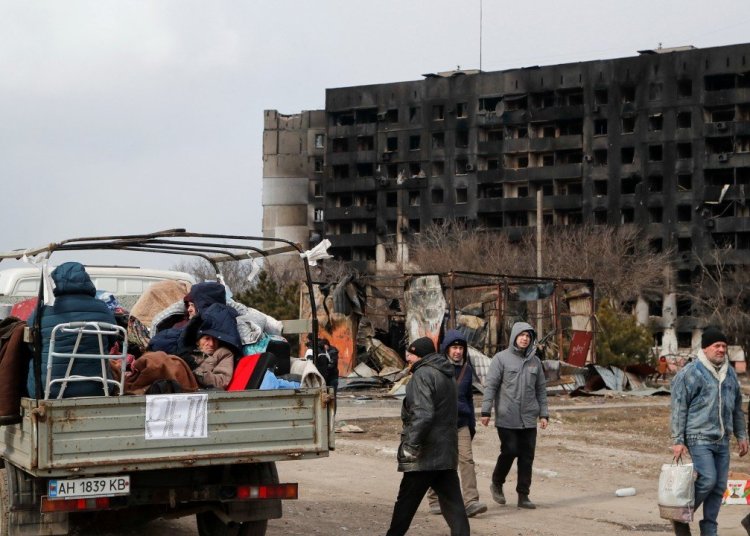Headlines
Russia-Ukraine War: Civilians Fleeing Mariupol Describe Street-to-Street Battles

By Derrick Bangura
As a constant Russian shelling tried to pound the city into submission, civilians fleeing Ukraine’s besieged southern port metropolis of Mariupol recalled escaping through street-to-street fire engagements and past unburied corpses.
While Russian forces kept the siege going after the city’s defenders refused to surrender, the Kremlin’s ground offensives in other parts of the nation were lagging or failing altogether, having been thwarted by lethal hit-and-run operations by the Ukrainians.
The Ukrainian army said early Tuesday that it had forced Russian troops out of a strategically important Kyiv suburb following a fierce battle. The regained territory allowed Ukrainian forces to retake control of a key highway to the west and block Russian troops from surrounding Kyiv from the northwest.
But Ukraine’s Defense Ministry said Russian forces battlinBut Ukraine’s Defense Ministry said Russian forces battling toward Kyiv were able to partially take other northwest suburbs, Bucha, Hostomel and Irpin, some of which had been under attack almost since Russia’s military invaded late last month.
Russian President Vladimir Putin’s forces are increasingly concentrating their air power and artillery on Ukraine’s cities and the civilians living there, killing uncounted numbers and sending millions fleeing.
A senior U.S. defense official, speaking on condition of anonymity to discuss the military’s assessment, said Russia had increased air sorties over the past two days, carrying out as many as 300 in the past 24 hours, and has fired more than 1,100 missiles into Ukraine since the invasion began.
In a video address Monday night, Ukrainian President Volodymyr Zelenskyy hailed those who have fought back against Russia.
“There is no need to organize resistance,” Zelenskyy said. “Resistance for Ukrainians is part of their soul.”
In Mariupol, with communications crippled, movement restricted and many residents in hiding, the fate of those inside an art school flattened on Sunday and a theater that was blown apart four days earlier was unclear. More than 1,300 people were believed to be sheltering in the theater, and 400 were estimated to have been in the art school.
Perched on the Sea of Azov, Mariupol has been a key target that has been besieged for more than three weeks and has seen some of the worst suffering of the war.
But no clear, independent picture emerged of how close its capture might be. Ukraine’s Defense Ministry said Tuesday that their forces were still defending the city and had destroyed a Russian patrol boat and electronic warfare complex.
Russia for now controls the land corridor from Crimea, the peninsula it annexed in 2014, and is blocking Ukraine’s access to the Sea of Azov, the ministry said.
“Nobody can tell from the outside if it really is on the verge of being taken,” said Keir Giles, a Russia expert at the British think tank Chatham House.
Over the weekend, Moscow had offered safe passage out of Mariupol — one corridor leading east to Russia, another going west to other parts of Ukraine — in return for the city’s surrender before daybreak Monday. Ukraine flatly rejected the offer well before the deadline.
Mariupol officials said on March 15 that at least 2,300 people had died in the siege, with some buried in mass graves. There has been no official estimate since then, but the number is feared to be far higher after six more days of bombardment.
For those who remain, conditions have become brutal. The assault has cut off Mariupol’s electricity, water and food supplies and severed communication with the outside world, plunging residents into a fight for survival. Fresh commercial satellite images showed smoke rising from buildings newly hit by Russian artillery.
Mariupol had a prewar population of about 430,000. Around a quarter were believed to have left in the opening days of the war, and tens of thousands escaped over the past week by way of the humanitarian corridors. Other attempts have been thwarted by the fighting.
Those who have made it out of Mariupol told of a devastated city.
“There are no buildings there anymore,” said 77-year-old Maria Fiodorova, who crossed the border to Poland on Monday after five days of travel.
Olga Nikitina, who fled Mariupol for the western Ukrainian city of Lviv, where she arrived Sunday, said gunfire blew out her windows, and her apartment dropped below freezing.
“Battles took place over every street. Every house became a target,” she said.
A long line of vehicles stood on a road in Bezimenne as Mariupol residents sought shelter at a temporary camp set up by Russian-backed separatists in the Donetsk region. An estimated 5,000 people from Mariupol have taken refuge in the camp. Many arrived in cars with signs that said “children” in Russian.
A woman who gave her name as Yulia said she and her family sought shelter in Bezimenne after a bombing destroyed six houses behind her home.
“That’s why we got in the car, at our own risk, and left in 15 minutes because everything is destroyed there, dead bodies are lying around,” she said. “They don’t let us pass through everywhere — there are shootings.”
In all, more than 8,000 people escaped to safer areas Monday through humanitarian corridors, including about 3,000 from Mariupol, Deputy Prime Minister Iryna Vereshchuk said.
Russian shelling of a corridor wounded four children on a route leading out of Mariupol, Zelenskyy said.
Elsewhere, Britain’s defense ministry said Ukrainian resistance has kept the bulk of Moscow’s forces more than 25 kilometers (15 miles) from the center of Kyiv, but the capital “remains Russia’s primary military objective.”
In the Russian-occupied southern city of Kherson on Monday, Russian forces shot into the air and fired stun grenades at protestors who were chanting “Go home!” Kherson early this month became the first major city to fall to Russia’s offensive.
Ukrainian authorities also said Russia shelled a chemical plant outside the eastern city of Sumy, sending toxic ammonia leaking from a 50-ton tank, and hit a military training base in the Rivne region of western Ukraine with cruise missiles.
Russia’s invasion has driven nearly 3.5 million people from Ukraine, according to the United Nations. The U.N. has confirmed over 900 civilian deaths but said the real toll is probably much higher. Estimates of Russian deaths vary, but even conservative figures are in the low thousands.
Talks between Russia and Ukraine have continued by video but failed to bridge the chasm between the two sides. The Kremlin has demanded that Ukraine disarm and declare itself neutral. Zelenskyy told Ukrainian television late Monday that he would be prepared to consider waiving any NATO bid by Ukraine in exchange for a cease-fire, the withdrawal of Russian troops and a guarantee of Ukraine’s security.
Zelenskyy also suggested Kyiv would be open to future discussions on the status of Crimea, which Russia seized in 2014, and the regions of the eastern Donbas region held by Russian-backed separatists. But he said that was a topic for another time, after a cease-fire and steps toward security guarantees
Headlines
Noble Ladies Champion Women’s Financial Independence at Grand Inauguration in Abuja

Women from diverse backgrounds across Nigeria and beyond gathered at the Art and Culture Auditorium, Abuja, for the inauguration and convention of the Noble Ladies Association. The event, led by the association’s Founder and “visionary and polished Queen Mother,” Mrs. Margaret Chigozie Mkpuma, was a colourful display of feminine elegance, empowerment, and ambition.
The highly anticipated gathering, attended by over 700 members and counting, reflected the association’s mission to help women realise their potential while shifting mindsets away from dependency and over-glamorization of the ‘white collar job.’ According to the group, progress can be better achieved through innovation and creativity. “When a woman is able to earn and blossom on her own she has no reason to look at herself as a second fiddle,” the association stated.
One of the association’s standout initiatives is its women-only investment platform, which currently offers a minimum entry of ₦100,000 with a return of ₦130,000 over 30 days—an interest rate of 30 percent. Some members invest as much as ₦1 million, enjoying the same return rate. Mrs. Mkpuma explained that the scheme focuses on women because “women bear the greater brunt of poverty” and the platform seeks “to offer equity in the absence of economic equality.”
Education is also central to the Noble Ladies’ mission, regardless of age. Their mantra, “start again from where you stopped,” encourages women to return to school or upgrade their skills at any stage in life. The association believes that financial stability is vital in protecting women from cultural practices that dispossess widows of their late husbands’ assets, while also enabling them to raise morally and socially grounded families.
Founded on the vision of enhancing women’s skills and achieving financial stability, the association rests on a value system that discourages pity and promotes purpose. “You have a purpose and you build on that purpose to achieve great potentials and emancipation,” Mrs. Mkpuma said.
A criminologist by training and entrepreneur by practice, she cautions against idleness while waiting for formal employment. “There are billions in the informal and non-formal sectors waiting to be made,” she said, rejecting the “new normal of begging” and urging people to “be more introspective to find their purpose in life and hold on to it.”
Mrs. Mkpuma’s management style keeps members actively engaged, focusing on vocational skills and training to prepare them for competitive markets. She is exploring “innovative integration of uncommon technologies” and is already in talks with international franchises to invest in Nigeria, with Noble Ladies as first beneficiaries.
The association’s core values include mutual respect, innovation, forward-thinking, equal opportunity, and financial emancipation. With plans underway to establish a secretariat in the heart of Abuja, the group aims to expand its impact.
The event drew high-profile guests, including former Inspector General of Police, Mike Okiro, and a host of VIPs, marking a significant milestone in the association’s drive for women’s empowerment.
Headlines
NEPZA, FCT agree to create world-class FTZ environment

The Nigeria Export Processing Zones Authority (NEPZA) has stepped in to resolve the dispute between the Federal Capital Territory Administration and the Abuja Technology Village (ATV), a licensed Free Trade Zone, over the potential revocation of the zone’s land title.
Dr. Olufemi Ogunyemi, the Managing Director of NEPZA, urged ATV operators and investors to withdraw the lawsuit filed against the FCT administration immediately to facilitate a roundtable negotiation.
Dr. Ogunyemi delivered the charge during a courtesy visit to the Minister of the Federal Capital Territory, Barrister Nyesom Wike, on Thursday in Abuja.
You will recall that the ATV operators responded to the revocation notice issued by the FCT administration with a lawsuit.
Dr. Ogunyemi stated that the continued support for the growth of the Free Trade Zones Scheme would benefit the nation’s economy and the FCT’s development, emphasizing that the FCT administration recognized the scheme’s potential to accelerate industrialisation.
Dr. Ogunyemi, also the Chief Executive Officer of NEPZA, expressed his delight at the steps taken by the FCT minister to expand the economic frontier of the FCT through the proposed Abuja City Walk (ACW) project.
Dr. Ogunyemi further explained that the Authority was preparing to assess all the 63 licensed Free Trade Zones across the country with the view to vetting their functionality and contributions to the nation’s Foreign Direct Investment and export drives.
“I have come to discuss with His Excellency, the Minister of the Federal Capital Territory on the importance of supporting the ATV to succeed while also promoting the development of the Abuja City Walk project. We must work together to achieve this for the good of our nation,” he said.
On his part, the FCT Minister reiterated his unflinching determination to work towards President Bola Ahmed Tinubu’s Renewed Hope Agenda by bringing FDI to the FCT.
“We must fulfil Mr. President’s promises regarding industrialization, trade, and investment. In this context, the FCT will collaborate with NEPZA to review the future of ATV, a zone that was sponsored and supported by the FCT administration,” Wike said.
Barrister Wike also said that efforts were underway to fast-track the industrialisation process of the territory with the construction of the Abuja City Walk.
The minister further said the Abuja City Walk project was planned to cover over 200 hectares in the Abuja Technology Village corridor along Airport Road.
According to him, the business ecosystem aimed to create a lively, mixed-use urban center with residential, commercial, retail, hospitality, medical, and institutional facilities.
He added that the ACW would turn out to be a high-definition and world-class project that would give this administration’s Renewed Hope Agenda true meaning in the North-Central Region of the country.
Barrister Wike also indicated his continued pursuit of land and property owners who failed to fulfil their obligations to the FCT in his determination to develop the territory.
Headlines
Benue IDPs block highway, demand return to ancestral homes

Vehicular movement along the Yelwata axis of the Benue–Nasarawa highway was brought to a standstill on Wednesday as Internally Displaced Persons, IDPs, staged a protest, demanding immediate return to their ancestral homes.
The protesters, believed to be victims of persistent attacks by suspected herdsmen, blocked both lanes of the busy highway for several hours, chanting “We want to go back home”.
The protest caused disruption, leaving hundreds of motorists and passengers stranded.
Eyewitnesses said the displaced persons, many of whom have spent years in overcrowded IDP camps, are expressing deep frustration over the government’s delay in restoring security to their communities.
“We have suffered enough. We want to return to our homes and farms,” one of the protesters told reporters at the scene.
Security personnel were reportedly deployed to monitor the situation and prevent any escalation, though tensions remained high as of press time.
Efforts to reach the Benue State Emergency Management Agency, SEMA, and other relevant authorities for comment were unsuccessful.
-

 Headlines4 years ago
Headlines4 years agoFacebook, Instagram Temporarily Allow Posts on Ukraine War Calling for Violence Against Invading Russians or Putin’s Death
-

 Headlines4 years ago
Headlines4 years agoNigeria, Other West African Countries Facing Worst Food Crisis in 10 Years, Aid Groups Say
-

 Foreign4 years ago
Foreign4 years agoNew York Consulate installs machines for 10-year passport
-

 News1 year ago
News1 year agoZero Trust Architecture in a Remote World: Securing the New Normal
-

 Entertainment3 years ago
Entertainment3 years agoPhyna emerges winner of Big Brother Naija Season 7
-

 Headlines2 years ago
Headlines2 years agoNigeria Customs modernisation project to check extortion of traders
-

 Entertainment2 years ago
Entertainment2 years agoMovie download platform, Netnaija, announces closure
-

 Economy2 years ago
Economy2 years agoWe generated N30.2 bn revenue in three months – Kano NCS Comptroller
















